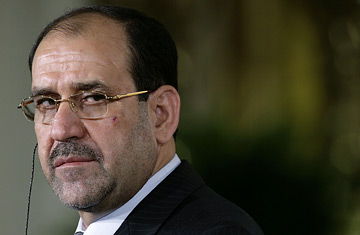
Iraq's Prime Minister Nouri al-Maliki.
Few leaders on the world stage face as many grave crises as Iraqi Prime Minister Nouri al-Maliki. So perhaps it's no surprise that Maliki has maintained his stony public image amid Iraq's latest political calamity, a withdrawal from the government by the main Sunni faction, the Iraqi Accordance Front.
The move by the Sunni bloc, known in Arabic as Tawafiq, leaves 12 empty seats in Maliki's cabinet, which is supposed to have 37 members. Six ministers tendered their resignation last week after Maliki failed to take any visible steps to address the faction's longstanding concerns, which revolve mainly around the fate of Sunni detainees held by the government and a lack of services in Sunni areas of the country. In the spring, six other ministers loyal to Moqtada al-Sadr abandoned Maliki's government in protest over the Prime Minister's refusal to take a stronger stance against the presence of American forces in Iraq.
The latest shakeup prompted serious worries in Washington, where President Bush phoned Maliki in an effort to salvage some sense of political progress in Baghdad despite an obvious breakdown. Maliki, though, seemed by comparison rather calm. And for good reason.
For one, he has options. His government is not in immediate danger of collapsing even with the vacancies. So long as Maliki retains the backing of the Kurdish alliance and one of the main Shi'ite blocs, his government has enough supporters to fend off a vote of no-confidence in parliament. And while efforts are under way at the moment to bring Tawafiq back into the fold, Maliki has other alternatives, too.
"It might be the case that Maliki believes that he can deal with other Sunni leaders," said a senior Western diplomat in Baghdad watching the situation closely. "We're at a period where the Sunni community is a bit up for grabs right now in terms of leadership."
One Sunni figure Maliki could court is Sheik Abdul Sittar, the leader of the tribal alliance in Anbar province. Maliki has offered a tentative embrace of Sittar's "Awakening" movement, in which Sittar banded together tribal leaders in Anbar to fight al-Qaeda in Iraq alongside the Americans. Few other Sunni leaders on the political stage in Iraq now hold as much sway as Sittar, who has made no secret of his desire to take on a larger leadership role in the country. A formal political alliance between Sittar and Maliki would leave little room in the political sphere for Sunnis affiliated with Tawafiq, which is thought to have ties to elements of the Sunni insurgency Sittar and his followers have foresworn.
